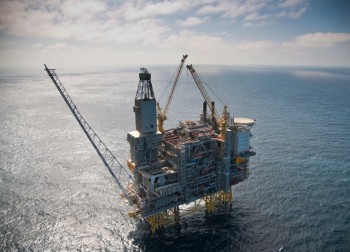NEWS ANALYSIS: Norway’s Labour-Center government is appealing a recent court ruling that it failed to comply with an earlier Supreme Court decision, which demands climate impact assessments for new offshore oil and gas fields. No such reports were prepared for three new fields, one of which is already producing more oil and gas, but the Norwegian government is appealing anyway in what appears to be another example of what one legal expert has called “the arrogant state.”

Energy Minister Terje Aasland confirmed on Wednesday that his energy ministry “disagrees” with a ruling from the Oslo County Court earlier this month that sided with climate and environmental organizations. They had sued on the grounds the state did not assess the climate consequences of the new oil and gas fields Breidablikk, Yggdrasil and Tyrving, and therefore ignored an earlier Supreme Court decision to do so.
The Supreme Court decision was handed down in 2020, and declared that the state must evaluate the global consequences for the climate before they approve new oil and gas projects. Now the Oslo County Court has ruled that state didn’t do that before granting the licenses for the three fields, one of which is already under production. The court also branded the state’s licenses as “invalid.”

Aasland, representing the state, is fighting back. He claimed on Wednesday that the state acted in line with regulations, that no mistakes were made and that the state will seek an appeals court decision on the matter.
Plaintiffs Greenpeace Norge and Natur og Ungdom were disappointed but not surprised by the state’s refusal to accept the County Court verdict. They will now fight back, too.
“We had hoped the state would be mature enough to accept that they lost on all counts in the Oslo court,” said Greenpeace leader Frode Pleym. “We have no reason to believe the outcome will be any different in the appeals court.” He’s well-versed on how the state will use its power and funding to drag out a legal challenge, adding that “we’re ready to carry on the fight on behalf of both ourselves and future generations.” Greenpeace and Natur og Ungdom also still claim that expansion and production on the three fields must be halted.
The state’s decision is the latest illustration of how it will appeal court decisions that aren’t in line with its policy, or exert its power in other ways. Hans Petter Graver, a law professor at the University of Oslo, wrote a lengthy commentary in newspaper Aftenposten this week, that was headlined Den arrogante staten (The arrogant state). In it Graver provides several examples of how instead of abiding by court rulings, state bureaucrats and politicians look for loopholes to avoid complying with them.
Examples included how the current government failed to comply with a Supreme Court decision in 2021 that declared licenses granted for controversial wind turbines on Sami grazing land “invalid,” because they violated the Samis’ human rights. It wasn’t until Sami, human rights and climate activists occupied government offices and launched huge demonstrations in Oslo that the government finally apologized, stepped up talks with Sami reindeer herders and tentatively settled with one group of them last month. Negotiations continue with the other offended group, after reindeer herders have described talks with the government as “difficult, tough and painful. Many here are frustrated and angry.”

Then came examples of how the government often overlooks criticism of its actions or recommendations from state auditors or even commissions that the government has appointed. Graver points to how the Corona Commission, for example, pointed out deficiencies in the foundation for measures to prevent the spread of infection, yet the government responded by ensuring itself of ways to handle new pandemics in the same manner.
There have also been huge protests over how the government has responded to a major scandal at welfare agency NAV, how it has ignored international protests over opening up Norway’s ocean floor to deep sea mining and tried to “sabotage” transparency of government negotiations on various issues. Then came the court case against the government last fall, when climate and environmental groups Natur og ungdom and Greenpeace Norge sued the state for allowing oil and gas production on three new offshore fields without first evaluating the impact of their oil and gas emissions. They won in what many viewed as a clear victory, with a court decision likely to be upheld at both the appeals- and Supreme Court levels.

Law professor Graver has noted how the case “doesn’t only say something about Norwegian petroleum policy and climate policy. It offers insight into what you can call ‘the arrogant state.'” The government, he wrote, doesn’t automatically bow to court decisions about how state law is interpreted.
“Several cases in recent years show that the Norwegian state apparatus has taken on new attitudes towards laws and regulations,” he wrote. Government management isn’t carried out first and foremost in line with the rules, Graver suggests, but with regard to finding solutions in line with the government’s political goals.
That leaves the government looking for loopholes in the law that can strengthen its own position. And that seems to be what the government is doing now, in refusing to accept and abide by the new ruling by the Oslo County Court and opting instead to fight it in court. Graver also thinks such resistance can be rooted in so-called “New Public Management” that can allow a higher degree of freedom to state bureaucrats when combined with demands for reporting and control.
The state’s behaviour when it comes to defying complaints from the public has become clear during the current Labour-Center government, which has been described as “historically unpopular” and out of touch with its own voters. Many have abandoned both the Labour and Center parties since the last election in 2021, with Labour now holding less than 20 percent of the vote and Center down to just a quarter of that in recent polls.
In yet another controversial decision on Wednesday, Prime Minister Jonas Gahr Støre announced an expansion of gas exploration area into the eastern Barents Sea, right up to Norway’s border to Russia. He justified the decision that further upsets climate and environmental activists by claiming how Europe “has become dependent on Norwegian energy,” therefore it’s important to open up 34 new regions for exploration and eventual production. He stressed that new technology should make gas production in the area more environmentally friendly.
Graver, meanwhile, is most concerned by what he calls “an arrogance towards the rules that we haven’t seen before.” He fears the rule of law will be weakened, “because people can’t rely to the same degree on the state to view it as its job to protect the rule of law if other goals and considerations are more important.” Therefore, he thinks, Norwegians’ traditionally high level of confidence in the state will to a greater degree be replaced by control mechanisms.
NewsinEnglish.no/Nina Berglund

